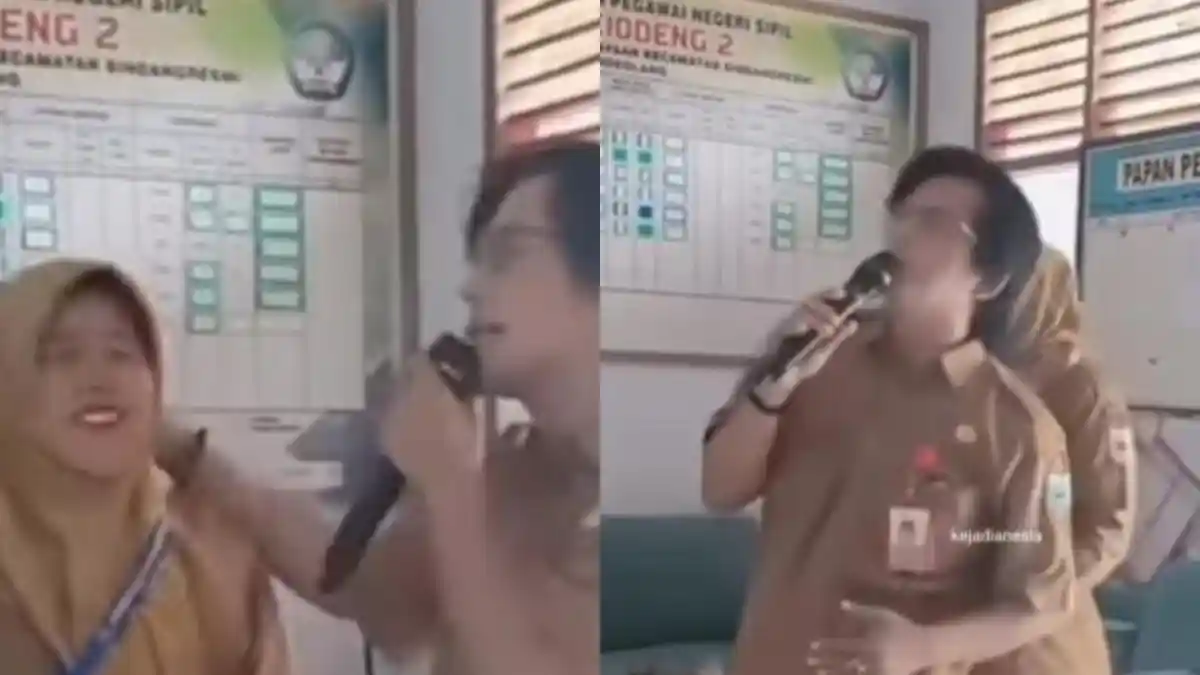A recent social media video has sparked widespread discussion about school ethics and the use of government assistance facilities. The video shows a school principal and a female teacher singing karaoke together while hugging at an elementary school, using a smart TV donated by the President. This incident has triggered strong reactions from both the public and local authorities, demanding strict action and a thorough review of the case.
The event took place at SD Negeri 2 Ciodeng, located in Pandeglang, Banten, a region also known as the home of the local Vice Regent. The video, which circulated widely on Instagram, captured the principal and a female teacher holding hands and singing in official uniforms. At several moments, the principal was seen hugging the teacher from behind, fueling various speculations about their relationship. The authorities have confirmed that the smart TV used for karaoke was a part of a government aid program aimed at supporting digital learning in schools.
Initial Response from Local Education Authorities
Following the public uproar, the Secretary of the Department of Education, Youth, and Sports for Pandeglang, Nono Suparno, verified the incident had taken place. In a telephone interview with the press, he explained that the case was already being handled by the relevant department within their organization. However, details regarding the official sanctions or disciplinary measures for both the principal and teacher remain unclear. Suparno stated he had not yet received further updates on the progress or depth of the investigation. This uncertainty has led to ongoing discussions and demands for transparency in managing the matter.
Public Backlash and Reputational Impact
The immediate consequences for those involved have come in the form of strong public condemnation. Many parents and community observers expressed outrage, particularly due to the use of in-school time and official facilities for activities considered inappropriate and unprofessional. The viral nature of the video has intensified scrutiny and pressure on school administrators to enforce strict disciplinary action. Reports indicate that both the principal and the teacher have faced widespread social media criticism, including harsh comments and public shaming across various platforms. This negative attention underscores the importance of appropriate conduct, especially for civil servants and educators who act as role models in society.
Concerns Over Misuse of Presidential Aid
A critical issue highlighted by the incident is the controversial use of a smart TV provided through a presidential assistance program. Intended to promote educational enrichment and digital literacy, the smart TV was instead used for karaoke sessions during school hours. This misuse has raised questions regarding the monitoring and management of government-provided resources in schools.
Key concerns identified include:
- Accountability: How schools ensure government aid is used for its intended educational purpose.
- Supervision: The effectiveness of oversight mechanisms to prevent misuse of equipment.
- Reporting Systems: Availability of complaint and reporting channels for inappropriate activities involving school facilities.
The local education office’s initial statement did not clarify what specific measures would be taken to prevent recurrence.
Possible Sanctions and Regulatory Guidelines
Based on regulations for civil servants and educators, the actions observed in the video could violate several codes of conduct. Some potential sanctions under Indonesian regulations include:
- Written Warning or Reprimand — For first-time or minor professional violations.
- Salary Deduction or Delay in Promotion — For more serious breaches that affect the reputation of the institution.
- Temporary Suspension — Often applies if the act leads to public disorder or discredits the public service.
- Demotion or Dismissal — Reserved for repeated or major violations involving abuse of authority or misuse of state property.
The legal process for imposing such sanctions typically involves an internal investigation, an official summons for questioning, and a review of evidence. The Department of Education is responsible for coordinating with related parties to ensure fair and lawful disciplinary actions.
Role of School Culture and Internal Supervision
This case has renewed attention on the importance of internal supervision and a healthy school culture. Many educators point out that regular training and reinforcement of professional ethics can help prevent such incidents. Schools are encouraged to:
- Establish clear guidelines for the use of both physical and digital resources during official hours.
- Provide regular workshops on professional behavior and ethics for teachers and staff.
- Set up internal monitoring systems and anonymous reporting channels for violations.
Education experts emphasize that poorly monitored school environments can lead not only to similar incidents but also erode public trust in the education system.
Official Investigation Status and Media Coverage
Journalists have tried to contact the Head of Primary School Development at the local education office for direct updates on the case. As of the latest reports, there has been no public statement or answer regarding the administrative follow-up or the status of those involved. Media coverage continues to focus on community reactions, the potential impact on students, and the need for improvements in school governance and facility usage.
Broader Context and Lessons for Public Institutions
This incident has become part of a larger discussion on accountability and ethical standards in public service and education. Community leaders and education observers have called for a transparent investigation and the establishment of stricter rules on the use of government assistance in schools.
The scandal at the elementary school in Pandeglang, involving karaoke with a smart TV meant for educational purposes, highlights the urgent need for effective supervision and ethical training for educators. Schools and related stakeholders are urged to use this as a learning moment to restore public confidence and maintain the integrity of the education system.
